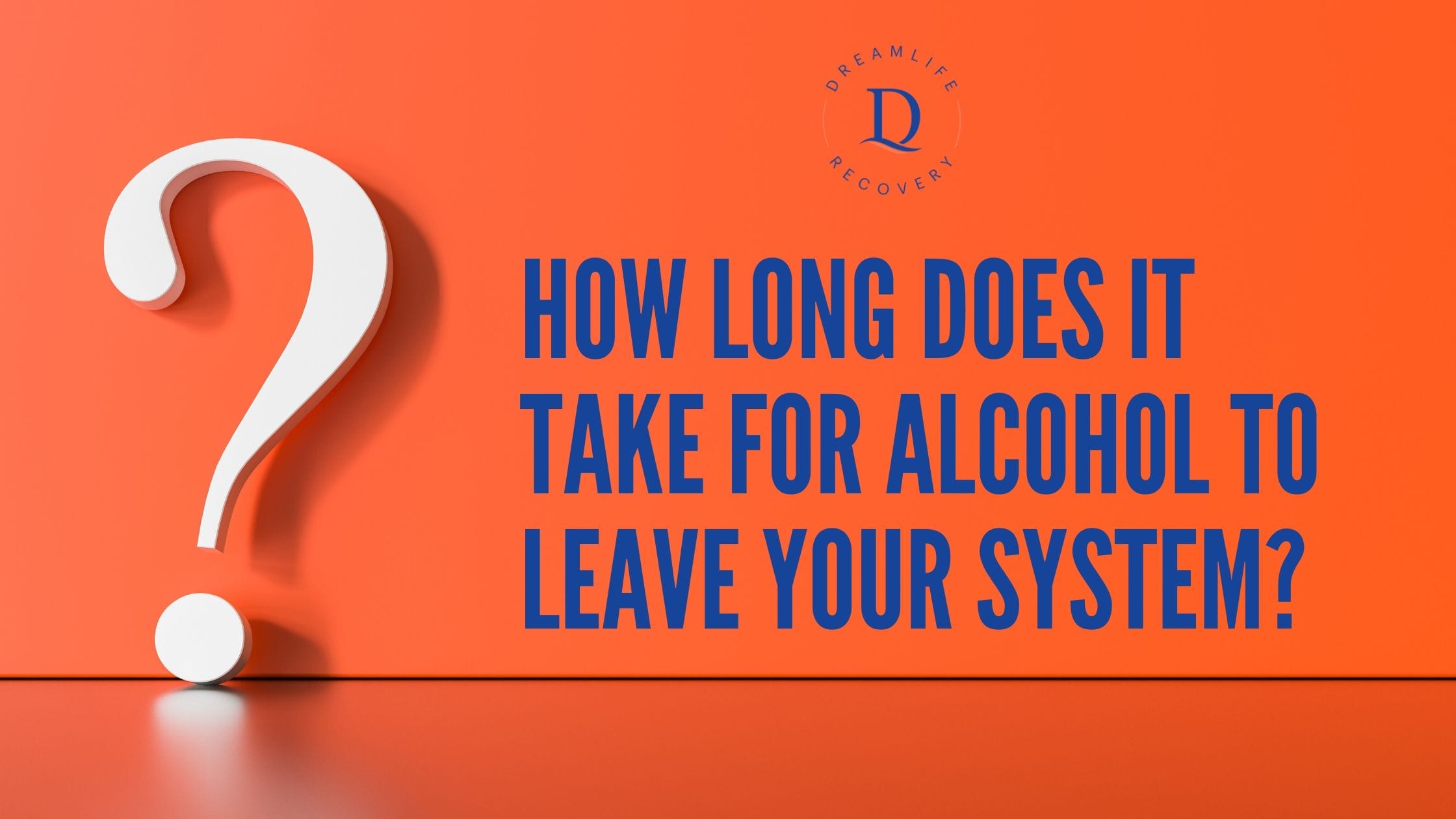How Long For Alcohol To Clear Your System

How long it takes for alcohol to leave your system after you stop drinking depends on many variables, which we will examine here. For an alcoholic who is going through detox, this could be an important question, especially if you are trying to understand when withdrawal symptoms may begin.
Another reason people want to know when the alcohol they have consumed will be out of their system is for drug testing to know how long it can be traced in the body. People also may want to know this for legal and safety reasons such as avoiding a DUI and understanding how long the alcohol will impair their abilities and reasoning.
How Does Alcohol Affect You?
Alcohol is a depressant that acts quickly in the body. Within minutes of consuming alcohol, you can feel the effects as it is absorbed from the stomach and digestive tract into the bloodstream. As a depressant, it suppresses the central nervous system, impairing communication in the brain, altering emotions and perceptions, and affecting movements and senses.
People who drink alcohol may feel more relaxed and less inhibited after having a drink or two, but for some people it can cause them to become prone to angry outbursts and aggressive or violent behavior. Speech may be slurred, reactions times slowed, coordination and walking impaired, and judgment compromised while under the influence of alcohol.
How Long Before Alcohol Effects Wear Off?
People often want to know how long it takes for the effects of alcohol to wear off, especially in situations when you realize you have had too much or that you suddenly have to "sober up." Popular wisdom falsely says to drink coffee to get sober or to take a cold shower, but neither of these practices will decrease the degree to which alcohol affects you and caffeine can make it worse, rather the flushing alcohol out of your system.
The substance in alcohol that causes intoxication is ethanol, which has a half-life of about four to five hours. That means in that time, half the alcohol in the bloodstream will be gone. Generally, people absorb alcohol faster than it can be metabolized, so it stays in the system longer.
Your degree of intoxication depends on your blood alcohol concentration (BAC), which is the ratio of the alcohol to water content in your blood. A BAC of 0.08 or .08 grams per deciliter of blood makes you legally drunk in the U.S. While two people could have the same BAC, how long it takes for the effects to wear off depends on how quickly their bodies metabolize the ethanol in the alcohol they've consumed.
How quickly a person metabolizes alcohol depends on:
- Sex (male or female)
- Weight
- Age
- Metabolism speed
- How much food eaten
- Type of alcohol
- How quickly alcohol was consumed
- If there are other substances involved
- Liver problems
On average the body can eliminate 0.015% BAC per hour, so depending on the person and type of alcohol, they may have a BAC of 0.02% – 0.03% at a rate of 1 drink per hour. That means, the body can take one to two hours to metabolize the alcohol consumed in that hour. If you have two glasses of wine with dinner, it could take up to six hours for you to fully break down the alcohol, depending on the variables listed above.
For a person with alcoholism who may consume closer to 10 glasses of wine (about two bottles) in a day or binge, it could take up to 15 hours or more for the body to fully metabolize and eliminate the alcohol consumed from the bloodstream. That means the person binge drinking two bottles of wine will not start to be "sober" until 12 hours to 15 hours after drinking.
How Long Does Alcohol Stay in Your System?
The physical sensation of being drunk—also known as a drinking high—can vary from person to person depending upon a number of internal and external factors. A common way to determine an individual's drinking impairment is by measuring their body alcohol content (BAC). This rough calculation is based off of how much alcohol an individual has consumed per hour, their body weight, gender, genetics, and other factors. According to the Centers for Disease Control and Prevention (CDC), a "standard" drink by these measurements has around 0.6 ounces (17 grams) of alcohol.
Across the United States, most states enforce a standard measurement of 0.08% as being beyond the legal limit of BAC in which a person (21-years or older) can lawfully operate any kind of vehicle. According to alcohol.org, the following BAC measurements often cause these symptoms:
- 0.02% – 0.02% is the lowest measurable volume of BAC. This level is often associated with relaxation, euphoria, warmth, and altered decision-making patterns.
- 0.05% – At 0.05% BAC, the average person may exhibit altered and exaggerated body movements and habits, such as speaking louder, poorer vision, and slurring words. This level is often considered dangerous to the individual. This is also the legal drinking limit in the state of Utah.
- 0.08% – 0.08% percent is the near-standard level of illegal impairment, in which every state, except Utah, recognizes as too drunk to operate any mechanical device safely. Self-control and concentration is greatly reduced at this level.
- 0.10% – Around 0.10% percent, an individual person struggles to control basic body functions, such as walking.
- 0.15% – At around 0.15%, the average person may begin exhibiting signs of sickness as the result of alcohol consumption, in addition to heavily degraded body control and decision-making.
- 0.20-0.29% – Beyond 0.20%, one's body control is extremely diminished. As well, pain receptors are often turned down, so injuries may go unnoticed. This BAC level is most commonly associated with nausea, but it is also the stage in which a person may experience blackouts of memory.
- 0.30-0.39% – Necessary functions like breathing and bladder control are at risk here, increasing the possibility of death.
- 0.40-0.49% – At and beyond this stage, the human body's capacity for drinking is at or near its maximum limits. It is possible to induce a coma state here, or suffer from heart attack, stroke, or other potentially deadly outcomes.
Even after the effects of alcohol wear off, it can remain in the body for long periods of time. Depending on the body system, alcohol can last different lengths of time. For example, alcohol is traceable in the saliva and breath for up to 24 hours after drinking, while it can be detected in the blood stream for up to 12 hours and in urine for up to five days, depending on the test used. Most surprising of all, alcohol can be found in hair strands for as long as 90 days after the last drink.
How Long Before Withdrawal Sets in After the Last Drink?
Withdrawal will vary from person to person. An alcoholic who stops drinking and begins to detox could experience withdrawal symptoms six hours after the last drink, and withdrawal can last days, weeks, or even months in some cases. Most withdrawal symptoms peak around 24 – 72 hours after the last drink.
Withdrawal symptoms can include:
- Nausea
- Headaches
- Anxiety
- Irritability
- Heart palpitations or rapid heart rate
- Shaking hands
- Tremors
- Sweating
- Hallucinations
- Fever
- Paranoia
- Seizures
Detox should be handled by professionals as the first step of residential treatment. For some people, severe alcohol withdrawal symptoms can be life-threatening without proper medical attention. In some cases of long-term alcohol abuse and depending on many personal factors, alcohol withdrawal syndrome can be best managed with medication-assisted treatment (MAT) in a clinical setting to reduce the cravings and the pain of withdrawal symptoms and help them start the healing process faster.
Addiction Treatment in Pennsylvania
Resources:
- "The risk of drinking too much" – NHS; 23 May, 2019
- "How Many Glasses In a Bottle of Wine?" – MasterClass
- "How Long Does Alcohol Stay in Your Body?" – Healthline; Kristeen Cherney, Rev. by Timothy J. Legg, Ph.D.; 29 March, 2019
- "How Long Does Alcohol Stay in Your System?" – Mental Health Today; 2015
- "How Long Does Alcohol Stay in Your System?" – VeryWellMind; By Buddy T., Rev. by Steven Gans, MD; 25 Nov. 2019
- "How Long Does It Take to Detox from Alcohol?" – Healthline; By Rachel Nall, MSN, CRNA; Rev. by Timothy J. Leg, Ph.D.; 10 June, 2019
Share
How Long For Alcohol To Clear Your System
Source: https://dreamliferecovery.com/how-long-does-it-take-for-alcohol-to-leave-your-system/
Posted by: bauersming1945.blogspot.com


0 Response to "How Long For Alcohol To Clear Your System"
Post a Comment